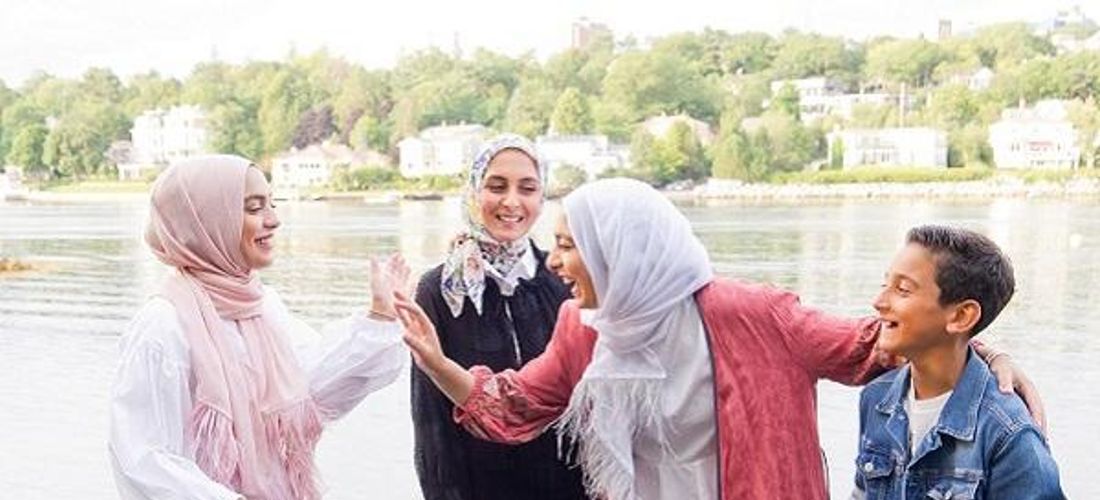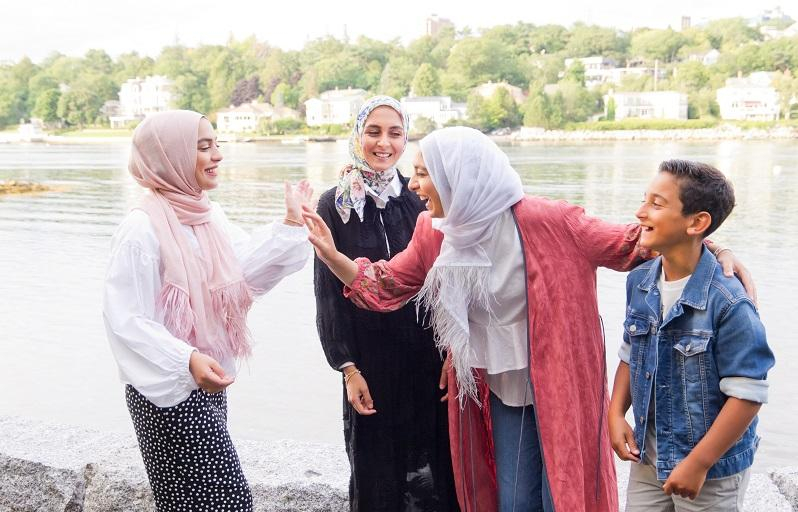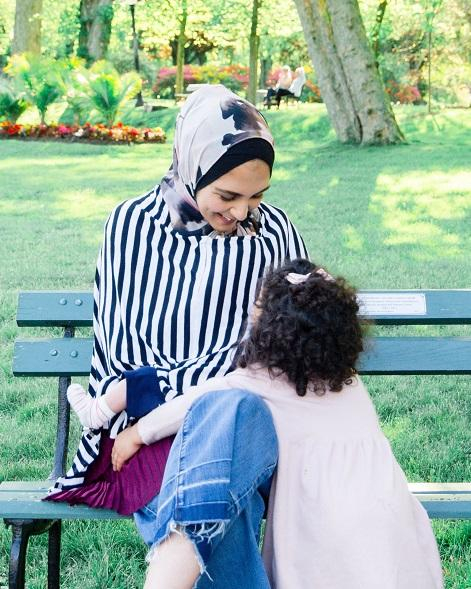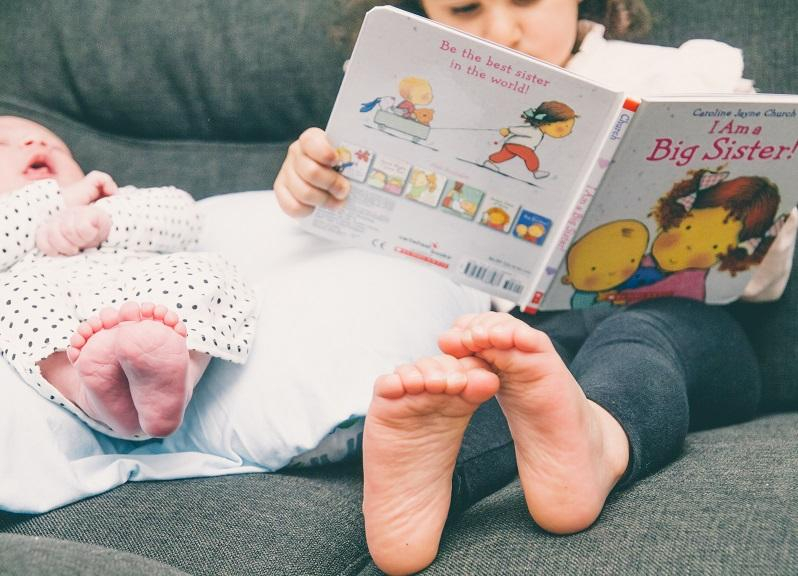Between Parents and Children & Brothers and Sisters – 5 Ties to Help Bind Us Together
Lifestyle
|
Jan 22, 2020
|
9 MIN READ

Editorial note: This month we are running a series focusing on foundations – how we can build solid foundations across all areas of our life to help ground us so that we can embrace all that our deen (religion) and dunya (the world) have to offer us. We will be covering foundations of marriage, faith, your morning routine, relationships, mental health/self care, technology, hijab and other areas. Each focus could really be a book, but we will try and break it down into the most useful, attainable and basic things we can do to build critical foundations in our lives.
By Danah Shuli
If you’ve been following our posts recently, you may have noticed a common theme: We are talking about everything foundations! A few weeks ago I wrote about Foundations of a Morning Routine Steeped in Faith Practices. Now I want to address another important topic, one that is emphasized in Islam in the Quran and sunnah – keeping good family ties.
This is a priority for many of us, especially if we have children. We strive to nurture a strong and loving relationship with our kids for many reasons, including to foster a stronger, meaningful relationship with them as they get older. But, familial relationships can branch out in many different variations – siblings, parents, grandparents, aunts, uncles, cousins and the list can go on.

Danah Shuli joking around with her brother and sisters. Image source: Danah
For the purposes of this post, I want to focus on laying a strong foundation of familial relationships between parents and their children and between siblings, both young and old. Both of these categories are relevant to me in this season of my life, as I am a mother to a three-year-old daughter and eight-month-old son. I am also the eldest daughter of three siblings – two adult sisters and my younger teenage brother. The following five building blocks have been crucial for me in fostering strong parental and sibling relationships and Insha’Allah will help you.
Modeling. Presenting a healthy and loving sibling relationship for my own children is something that is important to me. I want my siblings to play an active role in my children’s lives, and I believe that is only possible if I work hard on nurturing a strong relationship with them as their older sister. Like so many of us, I also want my children to maintain a strong relationship with one another and believe that my relationship with my siblings will directly impact on the type of bond my kids will have with one another.
Children see how we are in our relationships, and often they model that in theirs. As with any type of relationship, it is always a work in progress. I am continuously learning how to be the best mom I can be for my children and the best big sister to my siblings. In both categories, we have our good and bad days. My siblings and I argue a lot. There are also days when I feel like I need a break from my kids. But one thing is always constant – love. At the end of the day, I love my children and I love my siblings, and that’s the foundational block to any relationship.
Self care. Mothers, and caregivers in general, often forget to take care of themselves before taking care of their loved ones, which eventually leads to burnout and exhaustion (something that will be addressed in more detail in an upcoming post on the foundations of self care). I fall victim to this far too often and find myself putting the needs of my children and family before mine, wanting to make sure they are happy and healthy before I tend to myself. In recent years, I’ve found that this has had a direct impact on my motivation and happiness.
I’ve made it a priority to try and make sure my needs are met, like setting aside some time to be alone, get pampered or do something fun with my husband or friends without the kids. This has allowed me to reconnect with a part of myself that I often times feel I’ve lost along the way. It’s important for us to fill up our own tanks in order to be the best version of ourselves for those we love most. (Of course, this will look different from person to person, depending on your current season of life and parenting journey. For example, setting aside alone time or even taking care of yourself in any way is especially challenging for those of us raising children with disabilities, health issues or so many other things.)
Communication. One of the biggest challenges for me is remembering that my “three-nager” is not actually a teenager in a little body. She is a child in a child’s body. When we have our off days and emotions are high, this is especially hard for me to keep in mind. I want her to follow simple instructions, like to put on her socks and not cry over the banana that got cut in half. I’ve learned that the way you parent your children in various scenarios will have a direct impact on how they learn to react in different situations they are confronted with later in life.

If you have little ones of your own, you know that they are basically walking sponges absorbing everything that comes their way. It is easier said than done, but taking a second to collect yourself, give your toddler a hug, let them spill out their emotions and then try to understand what they really want will come a long way. You will not only teach them that it is ok to have emotions and cry, but they will also learn an important skill of communication, which is the foundation for any type of relationship in life.
When it comes to my siblings, my sisters and I get along pretty well for the most part. We are pretty close in age but have an array of personalities, so communication is always key. Learning how to work around each of their personalities can be tough, especially when we have very different views on things. I think it’s important to realize that with any relationship, you are going to come to a point where you will need to “agree to disagree.” That is ok as long as the respect is always there.
My not-so-little-brother is a different story. Because of our 15 year age difference, I find myself still treating him like a little boy. It’s hard for me to understand why he no longer wants to tell me about his day or why he can go through so many different moods in the span of ten minutes. He’s in the beginning of his teenage years where he enjoys his friends’ company over mine. He’s discovering himself, finding out what he really enjoys doing and what he wants to do in school. It's tough!
We all may remember what it was like being a teenager, full of emotions and confusion. I constantly find myself needing to take a step back and remind myself of what the world looks like from his point of view to try and understand why he reacts the way he does sometimes by trying to remember what it was like for me in my teenage years. Even though it feels like I’m pulling teeth sometimes, I try my best to talk to him about his day, what he’s into and what is bothering him. He eventually comes through, especially when he sees that I am trying to understand where he is coming from by treating him like an adult.
Humility. Having a little bit of humility will go a long way, especially as a parent modeling positive behaviors. When my daughter and I have had a long day and I have exhausted all my patience, I snap. I’m only human at the end of the day. The important thing (outside of trying not to snap!) is that I remember to collect myself afterwards and apologize. Yes, I apologize to my three-year-old for getting angry and yelling at her. She needs to know that just like she is allowed to show her emotions, there are times when my emotions will get the best of me. But, she also needs to know what needs to be done afterwards.
Apologizing doesn’t make me a weak parent. I am teaching my toddler a skill that is essential to any healthy relationship. I’ve seen this happen in front of my eyes, and I can’t tell you how rewarding it is to see your child learn and execute a life skill as important as this one.
It’s also important to have humility and admit to one’s mistakes in sibling relationships. This can be hard especially if my siblings and I are having a heated argument. As the older sibling, I usually find that if I begin with apologizing or modeling a positive behavior, the rest will surely follow. This type of responsibility comes with being the eldest. In a way, it is similar to parenting.
I want to be a good role model for my children and my siblings in order to maintain a close relationship with them. I also want to show my children that siblings can and will have disputes amongst each other, whether that's fighting over a toy or arguing about serious topics. But, the important thing is that we recognize when we’ve hurt one another and have the humility to admit it.

Danah's daughter reads to her baby brother!
Balance. I think we can all agree that life is about balance. In relationships, this is especially important in order to maintain your sanity as well as a strong bond between one another. When it comes to parents, many of us want to be our child’s friend. We want to show them that we can be fun, and we want them to feel comfortable enough to come to us when they need to talk about anything. There is, however, a fine line between parenting and friendship. Finding the right balance is key to keeping a healthy relationship. There is a time to be their friend and a time to remember that you’re the parent.
A home without rules and boundaries can quickly turn into chaos. But, too many rules or boundaries will turn a loving home into a stressful house. For me, at this stage of my parenting, I show my toddler that mommy and daddy can have fun and play too. Being engaged with my daughter and son during story time and playtime makes them more attentive. We say please and thank you, just as she’s expected to. We apologize when we’ve wronged her and each other. We pick up after ourselves. Realizing that children learn by example, I need her to see that the rules don’t just apply to her.
I apply the same concept in my relationship with my little brother. Because of the huge age difference between us, I don’t want him to think of me as his parent. As his older sister, I want him to come to me and feel comfortable enough to talk to me about things he may not want to talk to my parents about. I try my best to foster a friendship that is based on respect. I’m not one of his buddies from school, but I’m also not his parent. In many ways I find myself applying the same tactics as I do with my own children.
Love Languages. Knowing each other's love language is key to a thriving relationship. I’ve seen this work wonders with my husband and I, as well as with my children. Everyone expresses love differently and knowing how to show love in the way they receive it best is the perfect formula for a strong foundation in your relationship. For example, my daughter’s love languages are words of affirmation, quality time and physical touch. She flourishes when she gets one-on-one time with me or my husband. She loves to receive and give warm hugs and kisses, and she beams with joy when she hears the words “I love you.”
Right now, my son’s love language is physical touch, acts of service and words of affirmation. Carrying him around all day, rocking him to sleep, changing his diaper, giving him baths, nursing him while telling how much I love him – all that makes baby Jude the happiest.
Between my siblings, I am constantly trying to strengthen our bond by speaking to them through their unique and different love languages. After becoming aunts and an uncle, they love spending quality time with my kids. One of my sisters thrives on words of affirmation; she loves to know that her work hasn’t gone unnoticed. The other appreciates acts of service. Making her a warm cup of tea paired with a homemade cake will work wonders.
My brother loves receiving gifts. Whether they are on the higher end or something as simple as bringing him home some bubble tea or hot chocolate, his face will brighten up instantly, and I might even get a good conversation out of him.
Relationships are complex and are always a work in progress. I hope by sharing my own experiences and advice, I have inspired you to look into the different relationships in your own life and build lasting foundations in order to keep them strong for a lifetime, Insha’Allah.
Subscribe to be the first to know about new product releases, styling ideas and more.
What products are you interested in?

